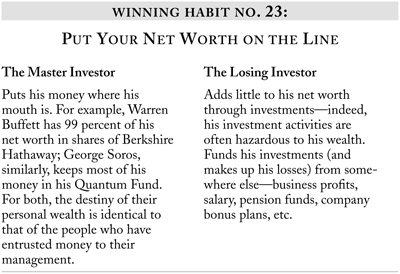
25
“Eat Your Own Cooking”
“I manage [the Quantum Fund] as if it were my own money—which it is to a large extent.”
—GEORGE SOROS1
“AROUND HERE, WE EAT OUR own cooking,” says Warren Buffett about where he puts his money. Ninety-nine percent of his net worth is in Berkshire Hathaway stock.
Buffett has the lowest salary of any CEO of any Fortune 500 company, just $100,000 per year. Not much more than a wet-behind-the-ears graduate with a freshly minted MBA from Harvard gets for his first job. As Berkshire pays no dividends, that’s the only money he takes home. Unless he were to sell some Berkshire stock, which is the last thing he wants to do.
So if he needs more spending money, what does he do? Applying the same methodology that made him a billionaire, he buys stocks in his personal account—taking advantage of opportunities too small to make a difference to Berkshire’s net worth; selling something when he needs a little extra cash.

Similarly, Soros has nearly all his net worth in the Quantum Fund. Soros Management receives a 20 percent share of the fund’s profits. If this fee is paid in kind—in shares of Quantum rather than cash—no tax is due until those shares are sold. So, before he started using his wealth to fund his Open Society Foundations, Soros personally owned some 40 percent of his Quantum Fund.
With the bulk of their wealth in Berkshire and Quantum, respectively, Buffett and Soros are no different from any entrepreneur: Bill Gates has most of his net worth in Microsoft stock; Rupert Murdoch’s money is in News Corp.; Michael Dell’s fortune rests in his shares of Dell Computer. Similarly, millions of businessmen around the world you have never heard of, both big and small, have most of their net worth tied up in their own companies.
There’s nothing controversial about that. Indeed, you’d expect to find successful businessmen with most of their net worth in their own business. That’s where they know how to make money more easily than anywhere else. That’s what they love to do.
In Investment Guru Land
But the moment you walk into Investment Guru Land it’s a totally different story. You’ll find that the investment guru who eats his own cooking is the exception, not the rule.
And this signals the major difference between the Master Investor and the investment guru. The Master Investor is an investor. The investment guru is a fortune seller. Whether he or she is a fund manager, a newsletter writer, a brokerage house analyst, or a financial advisor—selling opinions, not profitable investing, is what it’s all about.
And where does the media guru put his or her own money? Good question. One you should ask, especially when you’re looking for someone to manage your money.
The investment guru who doesn’t eat his own cooking may be entertaining to watch on TV. But if what he’s really saying is “Do what I say, not what I do,” why on earth would you want to follow his advice or hire him to look after your money? (Though it’s worth remembering that just because someone is following his own advice, it doesn’t automatically mean that he’s banking any profits.)
Every Master Investor puts his money where his mouth is for the same reason the successful businessman has his net worth tied up in his own business. Investing his way is the easiest way he knows to make money. And it’s what he loves to do.
How much of your net worth is backing your investment strategy? Your answer is the best index of your own confidence in what you are doing.